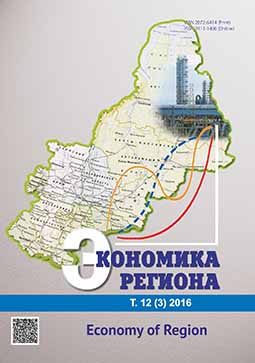Межбюджетное распределение налогов в России: концентрация полномочий или децентрализация управления
Interbudgetary Distribution of Taxes in Russia: Concentration of Power or Management Decentralization
Author(s): Maria Aleksandrovna Pechenskaya, Tamara Vitalyevna UskovaSubject(s): Economy
Published by: Институт экономики Уральского отделения Российской академии наук
Keywords: federal budget; regional budgets; local budgets; decentralization; budgetary authority; tax system; the effectiveness of tax policy; intergovernmental relations; the distribution of tax revenues;
Summary/Abstract: For Russia as a democratic federal state, federal relations are basic for the whole social development of the country. In this regard, it is particularly important to strike a balance between centripetal and centrifugal forces. The analysis of budget indicators presented in the article revealed the growing process of centralization, which enabled to conclude the low efficiency of the modern mechanism of tax allocation and its non-compliance to the principles of fiscal federalism. The growing budget crisis of the regions and the long-felt need of the structural reforming of Russian tax system require speedy implementation of internal reserves. Among these provisions, Russian scientists including the Institute of Socio-Economic Development of Territories of the Russian Academy of Sciences see the urgent need of the structural reform of the tax system in the Russian Federation. The results of the scientific search for answers to the questions of how and what it is expedient to amend, supplement, and delete in the Russian tax system are presented. In order to create incentives for the territorial authorities to increase the income, the algorithm of the distribution of tax revenue between the federal and regional budgets is developed on the basis of the estimations of the ratio of the volume of tax revenues collected in the region and received by the federal budget. Experimental calculations on the example of 83 subjects of the Russian Federation have identified the existing provisions of tax revenue growth in 36 subjects that could increase revenues by 2 –12 %. The authors have proposed a set of key measures for optimizing the tax incentive policies, involving the development of selective and differential principles of tax incentives, the introduction of compensatory forms of the loss of income as a result of benefits. The main measures to enhance the collection of regional and local property taxes are systematized.
Journal: Экономика региона
- Issue Year: 12/2016
- Issue No: 3
- Page Range: 875 - 886
- Page Count: 12
- Language: Russian

